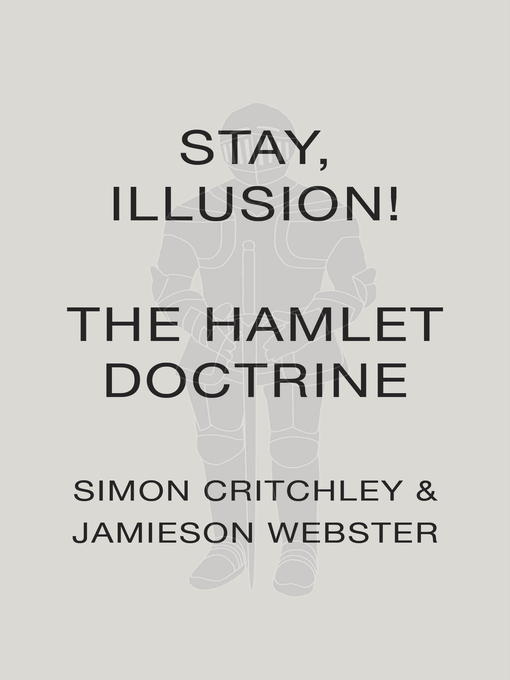
Stay, Illusion!
The Hamlet Doctrine
- اطلاعات
- نقد و بررسی
- دیدگاه کاربران
نقد و بررسی

April 8, 2013
In this insightful interpretation, philosopher Critchley (The Faith of the Faithless) and psychoanalyst Webster (The Life and Death of Psychoanalysis) offer their take on Hamlet, using as touchstones the work of analysts such as Freud and Jacques Lacan, philosophers like Walter Benjamin and Nietzsche, and writers such as James Joyce, all of whom have written about the play. The authors discuss Hamlet’s bizarre obsession with his mother, his inability to kill Claudius, as well as the oppression caused by the near-constant spying on others, among other topics. Of the theories presented to explain Hamlet’s failure to avenge his father, the most interesting is Hegel’s suggestion that with his experience with death, he becomes disgusted with humanity, and no longer cares to engage in the world except in an absurd, punning way; “the wrong man” for the job, he dies as a result of his own hesitation and external circumstance. Ophelia’s situation is also explored; used by Hamlet, Polonius, Laertes, and Claudius and Gertrude as bait, “her desire explodes onto the stage” in her madness scene and in the description of her death. Whether singing of flowers and their reproductive cycles, or appearing in a pool “mermaid-like” and with a voice “heavy with ‘drink,’ ” Ophelia finally expresses the sexuality restrained and ignored by others. The authors’ passion for the play and its questions are clearly evident. Agent: Nemonie Craven, Jonathan Clowes Ltd. (U.K.).

May 15, 2013
A philosophy professor and a psychoanalyst--also husband and wife--take Hamlet well beyond the confines of literary criticism and Shakespearean scholarship. It's likely that no more needs to be written about Hamlet, but Critchley (Philosophy/New School for Social Research; The Book of Dead Philosophers, 2008, etc.) and Webster (The Life and Death of Psychoanalysis, 2011) float the trial balloon that "arguably, Ophelia is not just the main casualty in Hamlet but its true tragic hero." As "outsiders to the world of Shakespeare criticism," they detail how their Hamlet obsession has generated "a goodly share of our connubial back and forth over the last couple of years." They focus their analysis on the analyses of other critical outsiders who were also obsessed with Hamlet--Freud, Hegel and Nietzsche among them, along with Nazi apologist Carl Schmitt. In a tone that is companionable and conversational despite the authors' obvious erudition, the book examines Hamlet through a variety of lenses--philosophical, psychological, political, Christian redemptive--without resolving the tension between thought and action that remains the essence of the work and generates so much fascination with it. "Hamlet is not a nice guy," write the authors, particularly to his father's murderer and successor, for whom the brooding prince is "a potentially malevolent force who should be feared, which--reflexively--is why he lives in fear." Yet if "Hamlet is a political tragedy in the most intense sense," then "the Danish prince is very much present at the birth of psychoanalysis." And its influence extends through "Joyce's astonishing trumping of all Shakespeare criticism in Ulysses," which is "a rumination on Hamlet from beginning to end." It won't be the last word on the play, but Critchley and Webster provide plenty of food for thought and fuel for obsession.
COPYRIGHT(2013) Kirkus Reviews, ALL RIGHTS RESERVED.

May 1, 2013
It is rashness that we need in reading Shakespeare. Taking these words from Virginia Woolf as their license, the husband-wife team of Critchley and Webster advance a daring commentary on the Bard's Hamlet. With help from other rash thinkersincluding Carl Schmidt, Hegel, Freud, and Nietzschealso outside of the fraternity of literary critics, this philosopher-psychologist pair pry from Shakespeare's play insights into politics, religion, and psychology. From Schmidt, for example, the authors steal a key for decoding a dangerous political message. (Did James Ilike the troubled prince of Denmarkhave a guilty mother and a murdered father?) With a nod to Hegel, the literary explorers glimpse in Hamlet's wild exchanges with Guildenstern and Rosencrantz the hint of dialectical philosophy. Borrowing from Freud, the bold exegetes learn why Ophelia pays the price when Hamlet crosses from mourning into melancholia. And readers reckless enough to join Nietzsche in Dionysian dance will recognize in Hamlet the reason that only illusion can precipitate decisive action. A spirited literary foray by audacious interlopers.(Reprinted with permission of Booklist, copyright 2013, American Library Association.)

January 1, 2013
As Critchley is Hans Jonas Professor of Philosophy at the New School for Social Research and series moderator of "The Stone," a philosophy column in the New York Times, and Webster is a psychoanalyst, they bring a different perspective to Shakespeare's immortal Hamlet.
Copyright 2013 Library Journal, LLC Used with permission.

April 1, 2013
Critchley (philosophy, New Sch.; Very Little...Almost Nothing) and psychoanalyst Webster (Eugene Lang Coll.; The Life and Death of Psychoanalysis) analyze Hamlet, the most enigmatic character in the Shakespearean corpus. The core of the book is a spirited dissection of various thinkers' perspectives, including those of jurist-philosopher Carl Schmitt, critical theorist Walter Benjamin, Freudian analyst Jacques Lacan, and German philosopher Friedrich Nietzsche. As an aside, Stephen Dedalus's theory in James Joyce's Ulysses appears here. The result is a short, rich book that may not convince all readers of its ideas but will spark provocative thought and is written with panache and humor. The authors' Hamlet is far from critic Harold Bloom's character--who transmogrifies into a hero at the end--in Hamlet: Poem Unlimited (2004). Here, Hamlet dies surrounded by a pile of corpses, still at odds with a universe that has abandoned him. VERDICT Critchley's philosophy column in the New York Times draws many readers. Accordingly, more patrons may pick up this engrossing study than normally would read such an abstract work.--David Keymer, Modesto, CA
Copyright 2013 Library Journal, LLC Used with permission.




دیدگاه کاربران